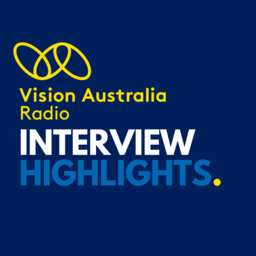White Cane Day 2021 recap: Sponsored by Uber.
On October 15, 2021, Vision Australia Radio aired a 2 hour broadcast to celebrate White Cane Day. Here is the broadcast in podcast form. You can learn more about the broadcast by reading our article here.
In 1 playlist(s)
Interview Highlights from Vision Australia Radio
Vision Australia Radio Interview Highlights shares a range of discussions initially broadcasted on o…Social links
Follow podcast
Recent clips

Interview Highlight: Emily Shanahan
13:06

Interview Highlight: Mac Bollella - 2026 SA State Election
14:26

Totally Lit - Word of Mouth - Home and Hope
50:54
 Interview Highlights from Vision Australia Radio
Interview Highlights from Vision Australia Radio